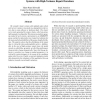Free Online Productivity Tools
i2Speak
i2Symbol
i2OCR
iTex2Img
iWeb2Print
iWeb2Shot
i2Type
iPdf2Split
iPdf2Merge
i2Bopomofo
i2Arabic
i2Style
i2Image
i2PDF
iLatex2Rtf
Sci2ools
131
click to vote
DSN
2007
IEEE
2007
IEEE
Performability Models for Multi-Server Systems with High-Variance Repair Durations
We consider cluster systems with multiple nodes where each server is prone to run tasks at a degraded level of service due to some software or hardware fault. The cluster serves tasks generated by remote clients, which are potentially queued at a dispatcher. We present an analytic queueing model of such systems, represented as an M/MMPP/1 queue, and derive and analyze exact numerical solutions for the mean and tail-probabilities of the queue-length distribution. The analysis shows that the distribution of the repair time is critical for these performability metrics. Additionally, in the case of high-variance repair times, the model reveals so-called blow-up points, at which the performance characteristics change dramatically. Since this blowup behavior is sensitive to a change in model parameters, it is critical for system designers to be aware of the conditions under which it occurs. Finally, we present simulation results that demonstrate the robustness of this qualitative blow-up be...
| Added | 14 Aug 2010 |
| Updated | 14 Aug 2010 |
| Type | Conference |
| Year | 2007 |
| Where | DSN |
| Authors | Hans-Peter Schwefel, Imad Antonios |
Comments (0)

